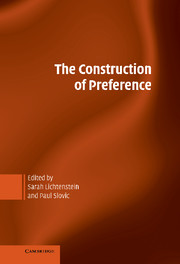Book contents
- Frontmatter
- Contents
- Contributors
- Preface
- Acknowledgments
- I INTRODUCTION
- II PREFERENCE REVERSALS
- III PSYCHOLOGICAL THEORIES OF PREFERENCE REVERSALS
- IV EVIDENCE FOR PREFERENCE CONSTRUCTION
- V THEORIES OF PREFERENCE CONSTRUCTION
- VI AFFECT AND REASON
- VII MISWANTING
- 27 New Challenges to the Rationality Assumption
- 28 Distinction Bias: Misprediction and Mischoice Due to Joint Evaluation
- 29 Lay Rationalism and Inconsistency Between Predicted Experience and Decision
- 30 Miswanting: Some Problems in the Forecasting of Future Affective States
- VIII CONTINGENT VALUATION
- IX PREFERENCE MANAGEMENT
- References
- Index
29 - Lay Rationalism and Inconsistency Between Predicted Experience and Decision
Published online by Cambridge University Press: 05 June 2012
- Frontmatter
- Contents
- Contributors
- Preface
- Acknowledgments
- I INTRODUCTION
- II PREFERENCE REVERSALS
- III PSYCHOLOGICAL THEORIES OF PREFERENCE REVERSALS
- IV EVIDENCE FOR PREFERENCE CONSTRUCTION
- V THEORIES OF PREFERENCE CONSTRUCTION
- VI AFFECT AND REASON
- VII MISWANTING
- 27 New Challenges to the Rationality Assumption
- 28 Distinction Bias: Misprediction and Mischoice Due to Joint Evaluation
- 29 Lay Rationalism and Inconsistency Between Predicted Experience and Decision
- 30 Miswanting: Some Problems in the Forecasting of Future Affective States
- VIII CONTINGENT VALUATION
- IX PREFERENCE MANAGEMENT
- References
- Index
Summary
Traditional decision theorists assume that when choosing between options that have the same costs, decision makers analyze which option will deliver the highest expected outcome utility and choose that option. This is a consequentialist utility analysis approach. In reality, people rarely base their decisions strictly on this approach.
In recent years, behavioral decision theorists have proposed that choices are often driven by decision makers' affect toward the choice options (e.g., Frederick, 2002; Hsee & Rottenstreich, 2004; Kahneman, Schkade, & Sunstein, 1998; Loewenstein, 1996; Loewenstein, Weber, Hsee, & Welch, 2001; Rottenstreich & Hsee, 2001; Slovic, Finucane, Peters, & MacGregor, 2002), and that such affect-driven decisions often lead to different choices than the consequentialist utility analysis would prescribe. For example, when choosing between two equally expensive computers, one with a faster processor and the other having a more appealing color, decision makers may focus more on the color of the computers than warranted by a careful consequentialist utility analysis. It appears that decisions are not “cold” enough.
In the present research, we suggest that decisions may be too “cold.” Decision makers may give too much weight to “rationalistic” factors by the consequentialist benchmark. Rationalistic factors are attributes, such as economic value, size, quantity, numerical specifications, and functions. At the end of the chapter, we discuss when people overweight rationalistic attributes and when they underweight these attributes, and how to reconcile the present research with research on affect-driven and impulsive decisions.
- Type
- Chapter
- Information
- The Construction of Preference , pp. 532 - 549Publisher: Cambridge University PressPrint publication year: 2006
- 1
- Cited by



